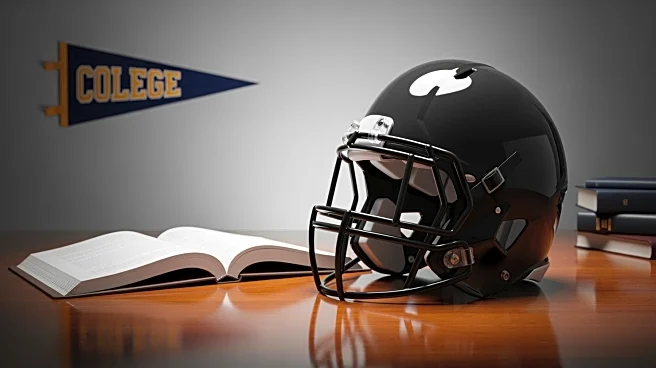What's Happening?
Arch Manning, the Texas Longhorns quarterback, has been under scrutiny regarding his readiness for the NFL. Despite showing improvement in recent games, Fox Sports analyst Joel Klatt believes Manning requires more experience before transitioning to professional
football. Manning's performance has been inconsistent, with early struggles followed by recent successes, including a notable game against Vanderbilt. Klatt emphasizes the importance of accumulating college starts, suggesting Manning needs at least 20 more to be considered a viable NFL prospect. Manning's family, including his uncles Peyton and Eli, have also advocated for his continued college development.
Why It's Important?
The discussion around Arch Manning's readiness for the NFL highlights the broader debate on the transition from college to professional sports. Manning's case underscores the importance of experience and development in college football, which can significantly impact a player's success in the NFL. This situation affects stakeholders such as college football programs, NFL teams, and sports analysts who evaluate talent and potential. Manning's extended college tenure could influence recruitment strategies and the timing of player transitions to the NFL, impacting team compositions and draft decisions.
What's Next?
Manning and the Texas Longhorns are set to face the Georgia Bulldogs, providing another opportunity for Manning to demonstrate his skills and progress. The outcome of this game could further influence perceptions of his readiness for the NFL. Additionally, Manning's performance in upcoming games will be closely monitored by analysts and scouts, potentially affecting his draft prospects and future career decisions. The ongoing debate about his readiness may also prompt discussions on the criteria for evaluating college players' transitions to professional leagues.
Beyond the Headlines
Manning's situation raises questions about the pressure young athletes face in meeting expectations set by family legacies and public anticipation. The emphasis on college starts as a measure of readiness could lead to changes in how talent is assessed, potentially affecting the career paths of future athletes. This scenario also highlights the cultural significance of football in the U.S., where family legacies and public expectations play a crucial role in shaping athletes' careers.














